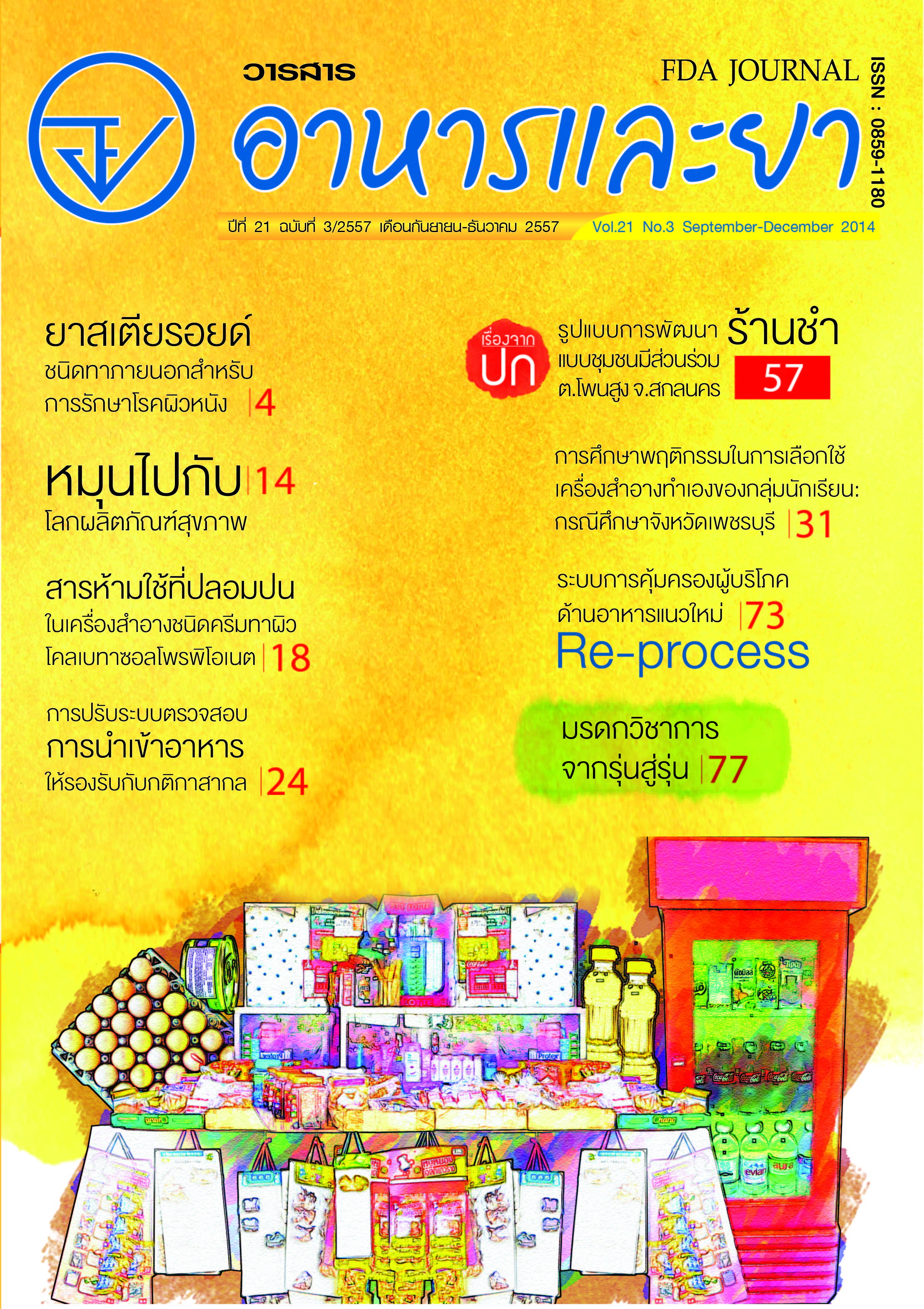สารห้ามใช้ที่ปลอมปนในเครื่องสำอางชนิดครีมทาผิว : โคลเบทาซอลโพรพิโอเนต
Main Article Content
บทคัดย่อ
จากกระแสความอยากขาว อยากใส ของวัยรุ่นที่นิยมมากในปัจจุบัน ท
ําาให้เกิดพฤติกรรม
การเลียนแบบ การบอกต่อในกลุ่มเพื่อนและคนใกล้ชิด การอยากลองใช้ การโฆษณาชวนเชื่อเกินจริงของผลิตภัณฑ์
เครื่องส
ําาอาง รวมถึงความรู้เท่าไม่ถึงการณ์ และการได้รับข้อมูลที่ไม่เพียงพอต่อการตัดสินใจเลือกใช้เครื่องส
ําาอาง
จึงอาจเกิดอันตรายต่อผู้บริโภคได้ หลังจากเกิดกรณีพบผู้ใช้คือกลุ่มนักเรียน อายุ 16-18 ปี ในจังหวัดเพชรบุรี
มีอาการแพ้ผื่นคัน ผิวหนังแตกลาย จากการใช้เครื่องส
ําาอางชนิดครีมทาผิวเป็นเวลานานตั้งแต่ 6 เดือน ถึง 2 ปี
ดังนั้น ในปีงบประมาณ 2556 ศูนย์วิทยาศาสตร์การแพทย์ที่ 5 สมุทรสงคราม ร่วมกับสําานักงานสาธารณสุข
จังหวัดเพชรบุรี จึงท
ําาการศึกษาเพื่อให้ได้ข้อมูลชนิดของสารห้ามใช้ หรือสารชนิดอื่นที่อาจปลอมปนในตัวอย่าง
เครื่องสําาอางชนิดครีมจําานวน 11 ตัวอย่าง ซึ่งเป็นครีมที่ไม่ได้จดแจ้ง แบ่งเป็น 4 ประเภท ได้แก่ ครีมแบ่งขาย
ใส่กระปุกที่มีฉลากระบุสรรพคุณใช้แล้วผิวขาว ลดจุดด่างดําา ครีมแบ่งขายใส่กระปุกที่ไม่มีฉลาก ครีมที่มีฉลาก
ภาษาจีน และครีมที่มีฉลากภาษาจีนที่ข้างกล่องมีตัวย่อ OTC ปรากฏอยู่ข้างกล่องซึ่งมีข้อมูลว่าใช้เป็นส่วนผสม
ของครีมที่ผสมใช้กันเองในกลุ่มนักเรียน ผลการวิเคราะห์ด้วยเครื่อง HPLC ตรวจพบสารสเตียรอยด์ชนิด
โคลเบทาซอลโพรพิโอเนตทุกตัวอย่าง โดยปริมาณที่ตรวจพบอยู่ในช่วง 8.0-449.8 มิลลิกรัมต่อกิโลกรัม
สารดังกล่าวจัดเป็นสารห้ามใช้ในเครื่องส
ําาอางตามประกาศกระทรวงสาธารณสุข เรื่องก
ําาหนดวัตถุที่ห้ามใช้
เป็นส่วนผสมในการผลิตเครื่องส
ําาอาง โคลเบทาซอลโพรพิโอเนตจัดเป็นยาสเตียรอยด์ทาภายนอกใช้รักษา
ผู้ป่วยโรคสะเก็ดเงิน และ โรคผิวหนังอื่นๆ ที่ตอบสนองต่อสเตียรอยด์ สารชนิดนี้เมื่อใช้ไปนานๆ จะท
ําาให้ผิวหนัง
บางลง เกิดจํา้าเลือดง่าย หรือมีรอยแตกที่ผิวหนัง เป็นต้น ทําาให้ผู้ใช้เครื่องสําาอางเหล่านี้มีความเสี่ยงที่จะได้รับ
ผลกระทบต่อสุขภาพ หน่วยงานที่เกี่ยวข้องจึงควรด
ําาเนินการแจ้งเตือนภัย เพื่อป้องกันอันตรายต่อผู้บริโภค
จากเครื่องสําาอางที่มีการปลอมปนสารสเตียรอยด์
ําาให้เกิดพฤติกรรม
การเลียนแบบ การบอกต่อในกลุ่มเพื่อนและคนใกล้ชิด การอยากลองใช้ การโฆษณาชวนเชื่อเกินจริงของผลิตภัณฑ์
เครื่องส
ําาอาง รวมถึงความรู้เท่าไม่ถึงการณ์ และการได้รับข้อมูลที่ไม่เพียงพอต่อการตัดสินใจเลือกใช้เครื่องส
ําาอาง
จึงอาจเกิดอันตรายต่อผู้บริโภคได้ หลังจากเกิดกรณีพบผู้ใช้คือกลุ่มนักเรียน อายุ 16-18 ปี ในจังหวัดเพชรบุรี
มีอาการแพ้ผื่นคัน ผิวหนังแตกลาย จากการใช้เครื่องส
ําาอางชนิดครีมทาผิวเป็นเวลานานตั้งแต่ 6 เดือน ถึง 2 ปี
ดังนั้น ในปีงบประมาณ 2556 ศูนย์วิทยาศาสตร์การแพทย์ที่ 5 สมุทรสงคราม ร่วมกับสําานักงานสาธารณสุข
จังหวัดเพชรบุรี จึงท
ําาการศึกษาเพื่อให้ได้ข้อมูลชนิดของสารห้ามใช้ หรือสารชนิดอื่นที่อาจปลอมปนในตัวอย่าง
เครื่องสําาอางชนิดครีมจําานวน 11 ตัวอย่าง ซึ่งเป็นครีมที่ไม่ได้จดแจ้ง แบ่งเป็น 4 ประเภท ได้แก่ ครีมแบ่งขาย
ใส่กระปุกที่มีฉลากระบุสรรพคุณใช้แล้วผิวขาว ลดจุดด่างดําา ครีมแบ่งขายใส่กระปุกที่ไม่มีฉลาก ครีมที่มีฉลาก
ภาษาจีน และครีมที่มีฉลากภาษาจีนที่ข้างกล่องมีตัวย่อ OTC ปรากฏอยู่ข้างกล่องซึ่งมีข้อมูลว่าใช้เป็นส่วนผสม
ของครีมที่ผสมใช้กันเองในกลุ่มนักเรียน ผลการวิเคราะห์ด้วยเครื่อง HPLC ตรวจพบสารสเตียรอยด์ชนิด
โคลเบทาซอลโพรพิโอเนตทุกตัวอย่าง โดยปริมาณที่ตรวจพบอยู่ในช่วง 8.0-449.8 มิลลิกรัมต่อกิโลกรัม
สารดังกล่าวจัดเป็นสารห้ามใช้ในเครื่องส
ําาอางตามประกาศกระทรวงสาธารณสุข เรื่องก
ําาหนดวัตถุที่ห้ามใช้
เป็นส่วนผสมในการผลิตเครื่องส
ําาอาง โคลเบทาซอลโพรพิโอเนตจัดเป็นยาสเตียรอยด์ทาภายนอกใช้รักษา
ผู้ป่วยโรคสะเก็ดเงิน และ โรคผิวหนังอื่นๆ ที่ตอบสนองต่อสเตียรอยด์ สารชนิดนี้เมื่อใช้ไปนานๆ จะท
ําาให้ผิวหนัง
บางลง เกิดจํา้าเลือดง่าย หรือมีรอยแตกที่ผิวหนัง เป็นต้น ทําาให้ผู้ใช้เครื่องสําาอางเหล่านี้มีความเสี่ยงที่จะได้รับ
ผลกระทบต่อสุขภาพ หน่วยงานที่เกี่ยวข้องจึงควรด
ําาเนินการแจ้งเตือนภัย เพื่อป้องกันอันตรายต่อผู้บริโภค
จากเครื่องสําาอางที่มีการปลอมปนสารสเตียรอยด์
Article Details
รูปแบบการอ้างอิง
1.
ไพบูลย์ศรีนครา น, กลิ่นสุนทร น, พุฒคำ เ. สารห้ามใช้ที่ปลอมปนในเครื่องสำอางชนิดครีมทาผิว : โคลเบทาซอลโพรพิโอเนต. TFDJ [อินเทอร์เน็ต]. 8 สิงหาคม 2018 [อ้างถึง 14 กุมภาพันธ์ 2026];21(3):18-23. available at: https://he01.tci-thaijo.org/index.php/fdajournal/article/view/139045
ประเภทบทความ
รายงานการวิจัย


